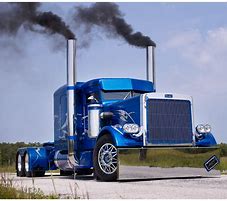RHODE ISLAND JOINS FORCES WITH 14 STATES, DISTRICT OF COLUMBIA TO ACCELERATE BUS AND TRUCK ELECTRIFICATION

Partners Pledge to Develop Action Plan to Cut Toxic Diesel Emissions
PROVIDENCE – The Department of Environmental Management (DEM) announces that Rhode Island is one of 15 states and the District of Columbia pledging to work collaboratively to advance and accelerate the market for medium- and heavy-duty electric vehicles including large pickup trucks and vans, delivery and box trucks, school and transit buses, and long-haul delivery trucks (big-rigs).
This week, Rhode Island signed a joint Memorandum of Understanding (MOU) to ensure that 100 percent of all new medium- and heavy-duty vehicle sales be zero emission vehicles by 2050. The MOU also sets an interim target of 30 percent zero-emission vehicle sales by 2030. Other states signing the MOU are California, Connecticut, Colorado, Hawaii, Maine, Maryland, Massachusetts, New Jersey, New York, North Carolina, Oregon, Pennsylvania, Vermont, and Washington.
“Rhode Island is pleased to be a partner in this ambitious goal to have all of the trucks and buses on our roadways powered by electricity generated from clean, renewable sources by 2050,” said DEM Director Janet Coit. “This is an essential step in reducing harmful emissions that contribute to climate change and will help improve air quality and public health for all Rhode Islanders. Climate change is the major environmental issue of our time, and with this initiative we are continuing to press forward to reduce greenhouse gas emissions from the transportation sector.”
The MOU will go a long way toward slashing harmful diesel emissions, cutting carbon pollution, and addressing climate change. The transportation sector is the nation’s largest source of greenhouse gas emissions and contributes to unhealthy levels of smog. While trucks and buses only account for four percent of vehicles on the road, they are responsible for nearly 25 percent of total transportation sector greenhouse gas emissions. Emissions from trucks are the fastest growing source of greenhouse gases, and the number of truck miles traveled on the nation’s roads is forecast to continue to grow significantly in the coming decades.
Truck and bus electrification will deliver widespread health benefits, particularly in communities with heavy truck traffic that are burdened with higher levels of air pollution. Medium- and heavy-duty trucks are a major source of harmful smog-forming pollution, particulate matter, and air toxics. These emissions disproportionately impact low-income communities which are often located near major trucking corridors, ports, and distribution hubs.
The MOU comes at an important transition point for the industry as investment in zero emission vehicle technology for the medium- and heavy-duty sector continues to ramp up. Today, at least 70 electric truck and bus models are on the market, and manufacturers are expected to make many more new models commercially available over the next decade. Apart from the public health benefits zero emission trucks and buses provide, by 2030, the total cost of ownership for many common commercial vehicles is projected to reach parity with conventionally fueled vehicles.
To provide a framework and help coordinate state efforts to meet these goals, Rhode Island and the other states signing the MOU will work through the existing multi-state ZEV Task Force facilitated by the Northeast States for Coordinated Air Use Management (NESCAUM) to develop and implement a ZEV action plan for trucks and buses. By promoting and investing in electric trucks and buses and the charging and fueling infrastructure needed to serve these vehicles, the signatory jurisdictions will support job creation, and help to build a resilient and clean economy.
For information on DEM programs and initiatives, visit www.dem.ri.gov. Follow us on Facebook at www.facebook.com/RhodeIslandDEM or on Twitter (@RhodeIslandDEM) for timely updates.
